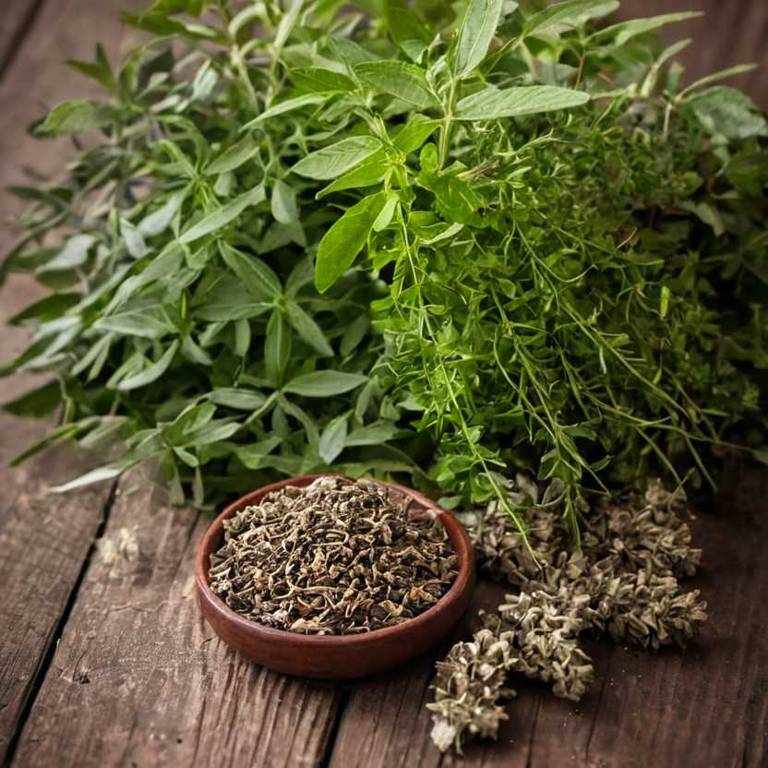10 Best Rhus Glabra Health Benefits

Rhus glabra, commonly known as staghorn sumac, offers several health benefits due to its rich content of antioxidants, vitamins, and minerals.
It contains high levels of vitamin C, which supports immune function and helps protect cells from oxidative stress. The plant is also a source of flavonoids and tannins, which have anti-inflammatory and antimicrobial properties. Some traditional uses suggest that it may aid in digestion and help alleviate symptoms of colds and respiratory infections.
However, it is important to consult a healthcare professional before using it for medicinal purposes, as it may interact with certain medications or cause adverse effects in some individuals.
1. Reduces inflammation
Rhus glabra reduces inflammation by containing compounds that inhibit the production of pro-inflammatory cytokines and enzymes.
This makes it effective in alleviating symptoms associated with inflammatory conditions such as arthritis and skin irritations. Its anti-inflammatory properties are attributed to its active constituents, including tannins and flavonoids. The plant has been traditionally used in herbal medicine to soothe inflamed tissues and promote healing.
Regular use of Rhus glabra may help manage chronic inflammatory disorders when used under professional guidance.
2. Boosts skin health
Rhus glabra boosts skin health by promoting the regeneration of skin cells and enhancing the skin's natural barrier function.
Its active compounds, such as tannins and flavonoids, have anti-inflammatory and antioxidant properties that help reduce redness, irritation, and oxidative stress on the skin. This plant is often used in topical formulations to treat conditions like eczema and psoriasis due to its soothing and healing effects. Regular use of Rhus glabra-based products can improve skin texture and resilience, making it a valuable ingredient in skincare routines.
Overall, it supports a healthier, more radiant complexion by protecting the skin from environmental damage and promoting overall skin vitality.
3. Supports immune system
Rhus glabra supports immune system by containing bioactive compounds that enhance the body's natural defenses.
These compounds, such as quercetin and other flavonoids, have antimicrobial and anti-inflammatory properties. Regular consumption of Rhus glabra may help reduce the risk of infections and promote overall wellness. It is believed to stimulate the production of white blood cells, which are crucial for fighting pathogens.
As a result, Rhus glabra is often used in traditional medicine to bolster immune function during seasonal changes or periods of stress.
4. Improves digestion
Rhus glabra improves digestion by stimulating the production of digestive enzymes in the gastrointestinal tract, which helps break down food more efficiently.
It also promotes healthy gut motility, reducing issues such as bloating and constipation. This plant has been traditionally used in herbal medicine to support overall digestive health and ease symptoms of indigestion. Its active compounds may help regulate the balance of gut flora, further enhancing digestive function.
As a result, Rhus glabra is valued as a natural remedy for maintaining a healthy and efficient digestive system.
5. Enhances joint health
Rhus glabra enhances joint health by reducing inflammation and supporting cartilage integrity.
Its active compounds, such as flavonoids and tannins, have anti-inflammatory and antioxidant properties that help alleviate joint pain and stiffness. This plant is often used in traditional medicine to treat conditions like arthritis and rheumatism. Regular use of Rhus glabra may improve mobility and reduce the risk of joint degeneration.
Overall, it serves as a natural remedy for maintaining healthy joints and promoting overall musculoskeletal well-being.
6. Improves circulation
Rhus glabra improves circulation by promoting the dilation of blood vessels, which helps increase blood flow throughout the body.
This herb is known to support the cardiovascular system by reducing the viscosity of blood, making it easier for the heart to pump and for nutrients to reach tissues. Improved circulation can lead to better oxygenation of cells, which enhances overall bodily function and energy levels. It is often used to alleviate symptoms related to poor circulation, such as cold hands and feet or varicose veins.
Regular use of Rhus glabra may contribute to long-term cardiovascular health and wellness.
7. Supports respiratory health
Rhus glabra supports respiratory health by helping to alleviate symptoms associated with conditions like asthma and bronchitis.
Its anti-inflammatory properties reduce irritation and swelling in the airways, making it easier to breathe. The plant contains compounds that may help loosen mucus and improve lung function. It has been traditionally used in herbal medicine to soothe coughs and reduce congestion.
Overall, Rhus glabra offers a natural approach to enhancing respiratory wellness.
8. Promotes wound healing
Rhus glabra promotes wound healing by stimulating the body's natural regenerative processes.
It contains bioactive compounds that help reduce inflammation and enhance cellular repair mechanisms. The plant's extracts have been shown to accelerate the closure of wounds and reduce the risk of infection. Additionally, Rhus glabra may support the growth of new tissue by promoting the proliferation of skin cells.
Its traditional use in herbal medicine further supports its role in facilitating faster and more effective wound recovery.
9. Aids in detoxification
Rhus glabra aids in detoxification by supporting the body's natural processes for eliminating toxins.
It contains compounds that may enhance liver function, which is crucial for filtering harmful substances from the bloodstream. This herb is believed to promote the production of bile, aiding in the digestion and removal of waste materials. By improving metabolic efficiency, Rhus glabra may help the body shed accumulated toxins more effectively.
Its detoxifying properties make it a valuable remedy in traditional and modern herbal medicine practices.
10. Reduces oxidative stress
Rhus glabra reduces oxidative stress by enhancing the body's antioxidant defenses through its bioactive compounds.
These compounds, including flavonoids and tannins, help neutralize free radicals that contribute to cellular damage. Studies suggest that Rhus glabra may support the activity of enzymes like superoxide dismutase and catalase, which are crucial in combating oxidative damage. The plant's ability to mitigate oxidative stress may have implications for preventing chronic diseases linked to oxidative imbalance.
By reducing oxidative stress, Rhus glabra may contribute to overall health and longevity.